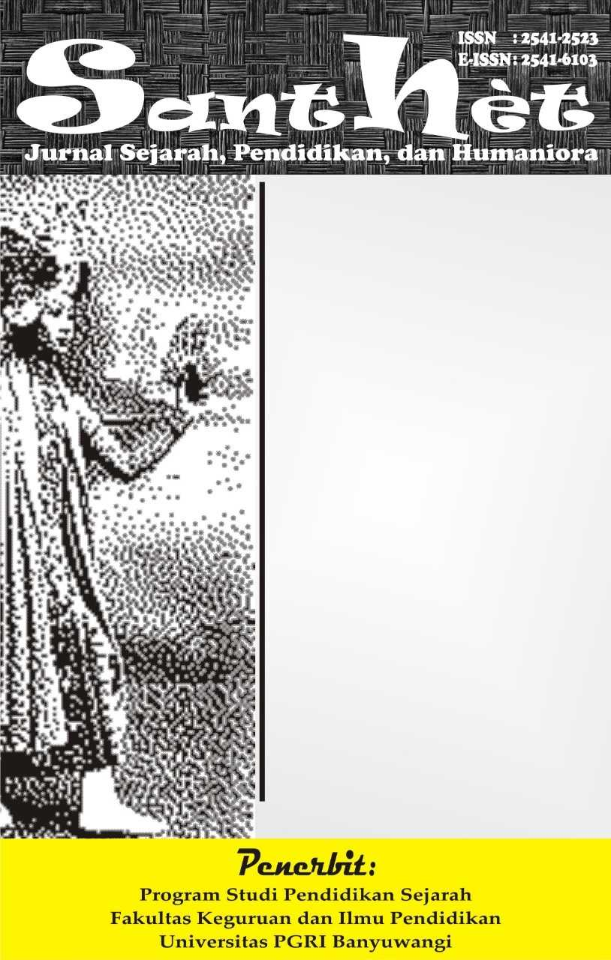The THE THRILL OF THE CLIMB: NEED FOR ACHIEVEMENT
Sensasi Dari Sebuah Pendakian: Kebutuhan Berprestasi
DOI:
https://doi.org/10.36526/santhet.v9i4.5652Keywords:
need for achievement, achievement, gratitude, never giving upAbstract
Need for achievement is an inner drive possessed by individuals to achieve the desired goals. The theory used in this study is David McCelland's theory with the need for achievement theory (1971). The purpose of this study was to determine the dynamics and description of need for achievement in SMP X Surabaya students.This research used a qualitative study approach. The choice of method and design is in accordance with the research objectives, namely to explore the need for achievement from the subject's point of view along with the dynamics that arise in the data collection process. The results of this study indicate that both subjects have a high need for achievement, because they have aspects of need for achievement and are followed by several attitudes such as self-confidence, gratitude, the role of spirituality, positive meaning and so on.There are several factors that make both subjects have a need for achievement, including having class goals and being balanced with productive activities so that they can make both subjects become empowered. Not only that, the attitude of a champion's heart is also determined by having an unyielding attitude, a hardy person, self-confidence, and having a sense of gratitude. Such a big push makes both subjects also have a need for achievement.
References
Anderman, E. M. (2020). Achievement motivation theory: Balancing precision and utility. Contemporary Educational Psychology, 61, 101864. https://doi.org/10.1016/j.cedpsych.2020.101864
Asiyah, A., Walid, A., & Kusumah, R. G. T. (2019). Pengaruh Rasa Percaya Diri Terhadap Motivasi Berprestasi Siswa pada Mata Pelajaran IPA. Scholaria: Jurnal Pendidikan Dan Kebudayaan, 9(3), 217–226. https://doi.org/10.24246/j.js.2019.v9.i3.p217-226
Creswell, J. W., & Poth, C. (2017). Qualitative Inquiry and Research Design : Choosing Among Five Approaches. https://openlibrary.org/books/OL286 33749M/Qualitative_Inquiry_and_R esearch_Design
Froiland, J. M., & Worrell, F. C. (2016). Intrinsic Motivation, Learning Goals, Engagement, And Achievement In A Diverse High School. Psychology in the Schools, 53(3),321–336. https://doi.org/10.1002/pits.21901
Harahap, H. S., Hrp, N. A., Nasution, I. N., Harahap, A., Harahap, A., & Harahap, A. (2021). Hubungan Motivasi Berprestasi, Predko, V. (2020). Psychological Significance Of Hardiness For Effective Adolescent Development In The Educational Environment.
Габітус, 19, 185–189. https://doi.org/10.32843/2663-5208.2020.19.32
Hauger, J. B. (2019). Hardiness Level And The Ability To Cope With Stressful Situations. https://doi.org/10.31979/etd.rxja-6x82
Haryanto, H. C., & Kertamuda, F. E. (2016). Syukur Sebagai Sebuah Pemaknaan. Insight (Yogyakarta), 18(2), 109. https://doi.org/10.26486/psikologi.v 18i2.395
Husna, A. N., Hidayati, F. N., & Ariati, J. (2014). Regulasi Diri Mahasiswa Berprestasi. Jurnal Psikologi UNDIP,13(1). https://doi.org/10.14710/jpu.13.1.50-63
Gall, T. L., & Bilodeau, C. (2017). “Why me?”–women’s use of spiritual causal attributions in making sense of breast cancer. Psychology & Health, 32(6), 709-727.
Kurniawati, W. D., & Suwahno, S. (2023). The Effect of Economic Conditions and Parental Motivation on Student Achievement. Journal of Social Knowledge Education, 4(2), 60–64. https://doi.org/10.37251/jske.v4i2.433
Laming, D. (2008). Human Motivation: How Does it Work? In Blackwell Publishing Ltd eBooks (pp. 278– 283). https://doi.org/10.1002/9780470773383.ch16
McClelland et al. (1971).The Achievement Society.New York:New Jerseyn Van Nostrand Reinhold
Özen, S. O. (2017). The Effect of Motivation on Student Achievement. In Springer eBooks (pp. 35–56). https://doi.org/10.1007/978-3-319-56083-0_3
Pratama, W., Ahman, E., Machmud, A., & Dahlan, D. (2023). Academic Hardiness, Learning Motivation, Student Learning Outcomes In InJJdonesia: The Mediation Effect. KnE Social Sciences. https://doi.org/10.18502/kss.v8i4.12
Putri, G. A., & Santhoso, F. H. (2023). Peran School Belonging dan Hardiness terhadap Motivasi Berprestasi pada Siswa Keluarga Menuju Sejahtera (KMS). Psyche 165 Journal, 16(2), 38–45. https://doi.org/10.35134/jpsy165.v16i2.227
Steinmayr, R., Weidinger, A. F., Schwinger, M., & Spinath, B. (2019). The Importance of Students’ Motivation for Their Academic Achievement –Replicating and Extending Previous Findings. Frontiers in Psychology, 10.
https://doi.org/10.3389/fpsyg.2019.01730
Ulstad, S. O., Halvari, H., Sørebø, Ø., & Deci, E. L. (2016). Motivation, Learning Strategies, and Performance in Physical Education at Secondary School. Advances in Physical Education, 06(01), 27–41. https://doi.org/10.4236/ape.2016.61004
Werdhiastutie, A., Suhariadi, F., & Partiwi, S. G. (2020). Achievement Motivation as Antecedents of Quality Improvement of Organizational Human Resources. Budapest International Research and Critics Institute Journal (BIRCI-Journal), 3(2), 747–752 Minat dan Perhatian Orang Tua Terhadap Kemandirian Siswa. Edukatif, 3(4), 1133–1143. https://doi.org/10.31004/edukatif.v3i 4.463
Werdhiastutie, A., Suhariadi, F., & Partiwi, S. G. (2020). Achievement Motivation as Antecedents of Quality Improvement of Organizational Human Resources. Budapest International Research and Critics Institute Journal (BIRCI-Journal), 3(2), 747–752.
https://doi.org/10.33258/birci.v3i2.886
Widyastuti, W., Fahmawati, Z. N., & Arifin, M. Z. (2021). Memahami Tahapan Perkembangan Anak dan Remaja. UmsidaPress. https://doi.org/10.21070/2021/978-623-6292-00-6
Wiebe, D. J. (2020). Hardiness and Health. In Springer eBooks (pp. 985–988). https://doi.org/10.1007/978-3-030-982





























